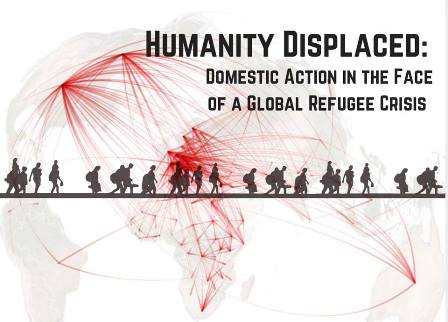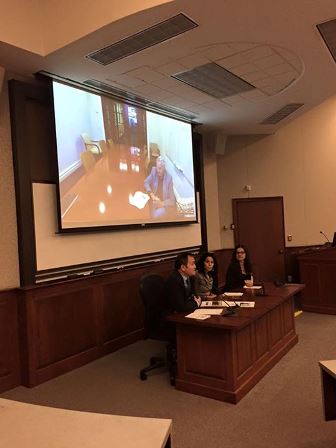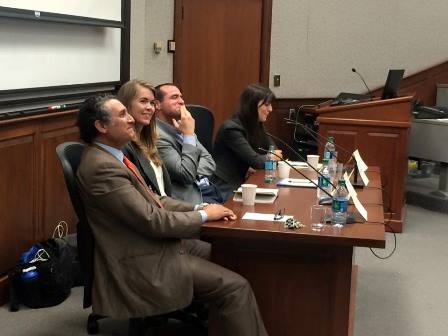
By Meghan Phillips
On October 30, 2015, the International Law Society, the Immigration Law and Service Society, and the Comparative Legal Student Scholars hosted “Humanity Displaced: Domestic Action in the Face of a Global Refugee Crisis,” a symposium exploring the current global refugee crisis and potential domestic action in the U.S. legal system to address this crisis. The symposium hosted nine experts: Shannon Mouillesseaux, Alim Seytoff, Stacie Blake, Peter Schuck, Shannon Powell, Alison Rabe, Laura Jabcobson, Nash Fayad, and David Baluarte, who composed two panels. The morning panel focused on framing the global issue of the refugee crisis, while the afternoon panel discussed the domestic legal solutions and challenges in addressing this worldwide issue.

Ms. Shannon Mouillesseaux began the morning panel. Ms. Mouillesseaux graduated from the College of William & Mary with a degree in anthropology and subsequently earned her Master’s degree from the University of Sussex in the United Kingdom. As a former protection officer with the United Nations High Commissioner for Refugees, she has nearly two decades of experience as an international practitioner, researcher, writer, and editor in the field of forced displacement. She has served as an advocate for stateless Vietnamese migrants in the Philippines, managed community service operations at UNHCR refugee camps in Burundi and Benin, monitored human rights violations in camps with internally displaced Sri Lankans, and managed the UNHCR’s refugee resettlement program in Djibouti where she oversaw the physical and legal protection of nearly 24,000 Somalian, Eritreans, and Ethiopians. Ms. Mouillesseaux’s talk focused on these experiences, and took a storytelling approach in which she presented photographs of UNHCR camps and refugees assisted by the camps along with the stories of some of the refugees that she assisted. These refugees both fled and endured difficult conditions in transit to the UNHCR camps. For example, she told the heartbreaking story of a refugee from the Democratic Republic of the Congo who was forced by an armed group to rape his own mother.
Next to speak on the morning panel was Mr. Alim Seytoff. Mr. Seytoff holds a Bachelor of Arts Degree in Chinese Studies from Xinjiang University, another Bachelor of Arts Degree in Broadcast Journalism from Southern Adventist University, a Master’s Degree in Public Policy from the Robertson School of Government at Regent University, and a Juris Doctor Degree from Regent University School of Law in 2006. Currently, Mr. Seytoff serves as the President of Uyghur American Association (UAA) based in Washington, DC. He is also the Director of the Uyghur Human Rights Project (UHRP). Mr. Seytoff’s talk discussed the situation of the Uyghur community and argued why this ethnic group should be considered a part of the global refugee crisis. Mr. Seytoff explained that the Uyghur people are an ethnic minority in China that is Muslim and is more related to the ethnic groups in Kazakstan, Tajikistan, and Krygistan than the Chinese. Thus, he said, they call their homeland, and the region in China where they predominately live, East Turkestan, which is in the north-west corner of China and comprises about one sixth of China’s total area. Mr. Seytoff said that he has been campaigning for the human rights and religious freedom of the Uyghur people since he came to the United States in 1996. He said that he has also testified many times before the U.S. Congress and briefed U.S. State Department officials on the situation for the Uyghur people in China. This situation, he said, is quite bleak. He accused China of perpetrating cultural genocide against his people. By this, he meant that the Chinese government aimed to suppress the Uyghur people’s ability to practice their Muslim faith, and the use of their own language. Additionally, he accused the Chinese government of using the events of 9/11 to try to brand the Uyghur people terrorists because they are Muslims. He said that these discriminative policies have caused many Uyghurs to attempt to flee China, but that it is nearly impossible for them to be successful in this because they are forced to pay bribes for fake documents so they exit the country and because most surrounding countries have extradition treaties with China that cause them to be deported back to China if they are discovered in one of those other countries. Mr. Seytoff says that often these Uyghurs are executed upon their return to China. These accusations were highly controversial with some of the symposiums guests: two LLM students from China. These students argued that they and other Chinese people do not believe the Uyghurs are a terrorist group, and also questioned the validity of some of his other claims of discriminative Chinese policies. While it was a tense moment, this served to underscore the controversy that pervades the refugee crisis, particularly in the areas of political claims to asylum and in who controls a country’s historical narrative of events.
Third to speak in the morning panel was Ms. Stacie Blake. Ms. Blake is the current Director of Government and Community Relations with the U.S. Commission on Refugees and Immigrants, an advocacy and community service group that has been supporting migrants since 1911. In this role, Ms. Blake is tasked with building and maintaining relationships with government and community supporters. Previously, she managed USCRI’s Vermont field office for three years, where she directed the Vermont Refugee Resettlement Program for 200 new arrivals per year. The Vermont Legislature has honored her work by awarding her a Joint Resolution of Appreciation recognizing her contributions in support of refugees and immigrants. Ms. Blake’s talk focused on the history of immigration and refugee rights in the U.S. She also explained the process of refugee resettlement in the United States. For example, she described the benefits refugees receive upon arrival like food, cash, and educational assistance. However, she argued that many people misunderstand this aid as a “handout,” when most of the aid is actually geared to ensuring these immigrants can become self-sufficient and integrate into American society.
The last speaker of the morning panel was Mr. Peter Schuck, the Simeon E. Baldwin Professor Emeritus of Law at Yale Law School since 2009. Mr. Schuck graduated from Cornell before earning his law degree from Harvard Law School and an LL.M. in International Law from N.Y.U., followed by an M.A. in Government from Harvard. Before launching his teaching career at Yale, Mr. Schuck was the Principal Deputy Assistant Secretary for Planning and Evaluation in the U.S. Department of Health, Education, and Welfare. He has published a number of articles and books on immigration and refugees, including a book comparing migrant integration in the U.S. and Germany, an essay about sharing the burdens of refugees among European countries, and opinion pieces in a number of popular newspapers. His most recent publication is titled “Why Government Fails So Often, and How It Can Do Better.” Mr. Shuck argued that to address the global refugee crisis, the international community should adopt a system wherein each country must commit to resettling a certain quota of refugees each year. But, he argued that it should operate much like the cap and trade system for emissions in that a country who wishes not to resettle its required quota of refugees, could make an agreement with another country which would take its quota in exchange for funding or some other incentive. For example, because Japan is only a small island nation and is quite homogenous, it might not feel comfortable with resettling refugees in its borders who are so different ethnically, culturally, or religiously. Therefore, under this plan the Japanese could pay another country like the United States to take its quota of refugees. This was an interesting idea, but left several of the symposium guests wondering how they should feel about putting a price on refugee lives.
The afternoon panel was held roundtable discussion style, with four panelists and a moderator who fielded questions to the panel. The moderator of this panel was Ms. Sharon Powell. Ms. Powell is the founder of Powell Law, PLLC, and works with individuals to apply for immigration benefits for which they are eligible, with professional entities to hire foreign national artists and athletic coaches, and offers her services to immigration law firms as a contract attorney. A graduate of Hamlin University School of Law, she began work in the field of immigration law in 2005 with the Lutheran Immigration and refugee service. She later moved to Minnesota to work for the Lutheran Social Service Refugee Services. Ms. Powell did a wonderful job directing the afternoon’s discussion, and also facilitating the asking of audience questions.

The first panelist on the afternoon panel was Ms. Alison Rabe. Ms. Rabe boasts a diverse array of international legal experience working on human rights issues such as land tenure, legal empowerment, indigent defense, and anti-corruption. Ms. Rabe graduated from the College of Idaho before attending William & Mary Law School. During her studies at William and Mary Law School, she was also a Boren Fellow, working to educate indigenous communities in Cambodia about land rights. She also served as a legal fellow for the UN Office of Drugs and Crime in Cambodia where she led a project providing technical assistance to the Cambodian government to adopt the UN Convention Against Corruption. She currently serves as an Asylum Officer for the U.S. Citizenship and Immigration Services in Miami, Florida. Ms. Rabe adjudicates asylum applications and interviews applicants to determine the credibility of their claims. Through her answers to Ms. Powell’s questions, Ms. Rabe explained the huge backlog of asylum applications the U.S. system is currently facing due to the global refugee crisis. She said that asylum interviews are very thorough to give applicants a fair opportunity to present their cases, and that in interviews she determines the credibility of their claims by examining what the applicants say happened to them, the consistency of their statement internally and with the documentation they have provided, the plausibility of their claims, and their demeanor. To do her job effectively, she is only able to do two asylum interviews a day. Therefore, because there are now so many asylum applications, it is quite difficult to address this backlog.
Next on the panel was Mr. David Baluarte. Mr. Baluarte graduated from Brown University and earned his law degree from American University. Prior to his teaching career, Mr. Baluarte served as a staff attorney in the Immigration Unit of the U.S. Court of Appeals for the Second Circuit and also as a staff attorney at the Center for Justice and International Law. After his time as a staff attroney, Mr. Baluarte was a Practitioner-in-Residence and Arbenz Fellow in the International Human Rights Law Clinic at American University Washington College of Law. He also worked with the UN High Commissioner for Refugees and the Open Society Justice Initiative while he taught at American University. Currently Mr. Baluarte is the Director of the Immigrant Rights Clinic and a professor at Washington & Lee Law School. He has published several papers and articles on immigration, refugees, the rights of stateless persons, and international law and practice. He drew on this wealth of experience, particularly his experiences serving client in the W&L Immigrant Right Clinic in his answers. In particular, he addressed how stateless persons can have difficulty in making asylum claims because they might not fit the stringent definition of a refugee, which involves proving persecution of account of membership in one of five protected classes (nationality, race, religion, political view, or particular social group).
Third on the panel was Mr. Nash Fayad. Mr. Fayad earned a PhD in Jurisprudence with a specialty in International Human Rights Law at the Institute of States and Law of the Russian Academy of Sciences. He earned his L.L.M. degree from William & Mary Law School and subsequently worked with the Catholic Diocese of Richmond Refugee and Immigration Services. He served indigent immigrants and aided refugees with asylum claims until he joined Affiliated Attorneys in Richmond, where he developed an Immigration Law Division for the firm. In 2004, Mr. Fayad founded his own firm, Fayad Law, P.C. in Richmond, Virginia, with a goal to advocate for the human rights of immigrants and refugees. He has since expanded Fayad Law’s services to include family and criminal law in addition to immigration law. In his answers, Mr. Fayad talked about how immigration lawyers must be creative in order to help their clients show the government that their persecution was due to the fact that fall into one of the five protected classes. For example, he talked about how the category of particular social group is a sort of gray area that lawyers have successfully obtained asylum for victims of female genital mutilation and China’s one child policy. However, he lamented that the jurisprudence in this area is designed to keep particular social groups small, even when such a group might have endured terrible atrocities. For instance, he pointed to the fact that cases in which the person claims persecution by a gang are rarely successful.
The final member of the afternoon panel was Ms. Laura Jacobson. Ms. Jacobson graduated from Northwestern College in Iowa and then attended law school at William & Mary where she was awarded the Law School’s Thurgood Marshall Award for distinguished public service. She is the founder of L&L Law Firm, an immigration law focused firm in Richmond, Virginia. She previously worked as a staff attorney at Catholic Charities’ St. Frances Cabrini Center for Immigrant Legal Assistance in Houston, Texas, where she helped refugees and asylees gain permanent residence. She also assisted Cuban nationals and their families obtain benefits under the Cuban Adjustment Act. Ms. Jacobson also aided children with Special Immigrant Juvenile Status (SIJS) applications, which grant lawful permanent resident status to children who have been abandoned, abused, or neglected by their parents. Ms. Jacobson has represented clients before the Houston Immigration Court and in interviews before USCIS. During the panel, Ms. Jacobson lamented the terrible conditions of detention facilities, particularly for families. She also joined the discussion on the issues surrounding asylum claims arising out of membership in a particular social group. She said that despite the difficulty in gang cases in this category, there is some cause for hope. Recently, she said, in the case of In Matter of ARCG, a Guatemalan woman was successful in making a particular claim based on the fact that she was a victim of domestic violence. Ms. Jacobson also highlighted the fact that asylum is not the only legal solution to the global refugee problem. Some other paths to legal status in the United States she said include Temporary Protected Status. TPS is for refugees from certain countries designated by Congress such as Syria, who might have difficulty in making asylum claims do to the huge backlog but who are allowed to stay and work in the U.S. while their country is in turmoil.
